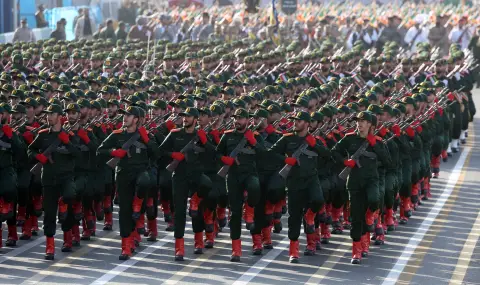The US will not support an Israeli attack on Iranian nuclear sites, writes the "Guardian", referring to a statement by US President Joe Biden. and notes that he said this as Washington tries to moderate Israel's response to Iran's missile attack on Tuesday and prevent a sharp escalation of the conflict.
"My answer is "No", the US leader told journalists.
The newspaper commented that against this background, Israel's permanent representative to the UN has warned that his country's retaliatory actions will be tougher than Tehran "can imagine". That same day, Israel's Chief of General Staff, Lt. Gen. Herzi Halevi, said that Israel has "the capabilities to reach and strike every point in the Middle East," a fact that Israel's enemies will "soon realize." And as Israel contemplates opening a fourth front against its regional adversaries, eight Israeli soldiers were killed and a significant number wounded in three clashes with the Lebanese Shiite movement Hezbollah that erupted after Israel's biggest incursion into Lebanon since the war with Hezbollah" in 2006, adds "Guardian".
"Independent" also dwells on the death of eight servicemen from the Israel Defense Forces (IDF) and notes that the ground fighting in Lebanon with "Hezbollah" represent an intensification of the conflict between Israel and the Lebanese Shiite movement.
The publication highlights the fact that yesterday Israel struck a building in Beirut's "Bashura" neighborhood, which is close to the Lebanese parliament, while against this backdrop, "Hezbollah" reported that the group's fighters claimed to have managed to destroy three Israeli "Merkava" tanks.
"Daily Telegraph" notes that pressure is growing inside Israel itself to deal a decisive blow to Iran's nuclear program in view of the targets of Tuesday's Iranian missile strike, which included the headquarters of the Mossad intelligence service and several IDF air bases.
In this regard, the newspaper quoted a statement by Naftali Bennett, the popular former Israeli prime minister and Prime Minister Benjamin Netanyahu's main rival for the votes of Israeli voters, who called on Netanyahu to "destroy Iran's nuclear project, all their major energy facilities and hit critically (hard) this terrorist regime".
But analysts say an Israeli response is more likely to target facilities such as oil refineries, ports, weapons depots and even Iran's fragile water infrastructure, rather than nuclear sites. According to Biden, the Israeli response must be "proportionate," which excludes strikes on nuclear targets. As reported, the Israeli security cabinet has decided to take direct military action against Iran, perhaps as early as the next few days, adds the "Daily Telegraph".
After the missile attack, Israel may be ready to risk a full-scale war with Iran, writes the "New York Times". The publication notes that for years the two sides have avoided direct confrontation, with Israel covertly sabotaging Tehran's interests and killing its representatives without claiming responsibility, while the Islamic Republic has encouraged its allies to attack Israel and itself refrained from does it personally. Both sides now appear willing to risk direct, protracted and extremely costly conflict. After Israel invaded Lebanon to counter Iran's strongest ally "Hezbollah" and after Iran's second missile attack on its territory in less than six months, Israel appears ready to strike the Islamic Republic in a more powerful and hard-hitting way than it has done before, while Iran promises a massive response if Israel decides to do so step.
"The situation is now different," said Yoel Guzansky, a former member of Israel's National Security Council who was responsible for shaping the strategy on the Iranian issue. "In Israel, we have a consensus - both among the military and among defense experts, analysts and politicians - that the Iranian attack must be responded to with force." Many Israelis now have nothing to lose - Iran's attempts to hit the heavily urbanized areas around Tel Aviv are crossing a line that Tehran had not crossed, even in its April missile attack, which targeted air bases rather than civilian areas.
Critics often have a habit of blaming Israel for being the root cause of problems in the Middle East, but according to most Israelis, they themselves are the victims of constant attacks by Iran's allies - most notably Hamas. in Gaza, the Houthis in Yemen and "Hezbollah" in Lebanon - and feel they haven't done enough to protect themselves. As a result, calls are intensifying in Israel to hold Iran fully accountable for its allies' attacks, even under the threat of an explosive response.
Iran is vulnerable to Israeli counterattacks after strikes on its allies, opined in a column for the "Wall Street Journal" the chief correspondent of the publication on foreign policy topics, Yaroslav Trofimov. He notes that there are no good options for Iran from now on, given that Israel has neutralized two of Tehran's strongest allies - Hezbollah. and "Hamas" - who are currently fighting for their survival.
Thus, the Islamic Republic lost one of the main pillars of its defense strategy, giving Israel the opportunity to strike Iran, which Israel considers the most dangerous of its adversaries.
The United States and the G7 have warned Israel not to attack Iranian nuclear facilities, writes the "Financial Times".
The publication notes that Western officials fear that Washington may have insufficient influence over Israel's actions as they try to prevent an escalation of the regional conflict.
